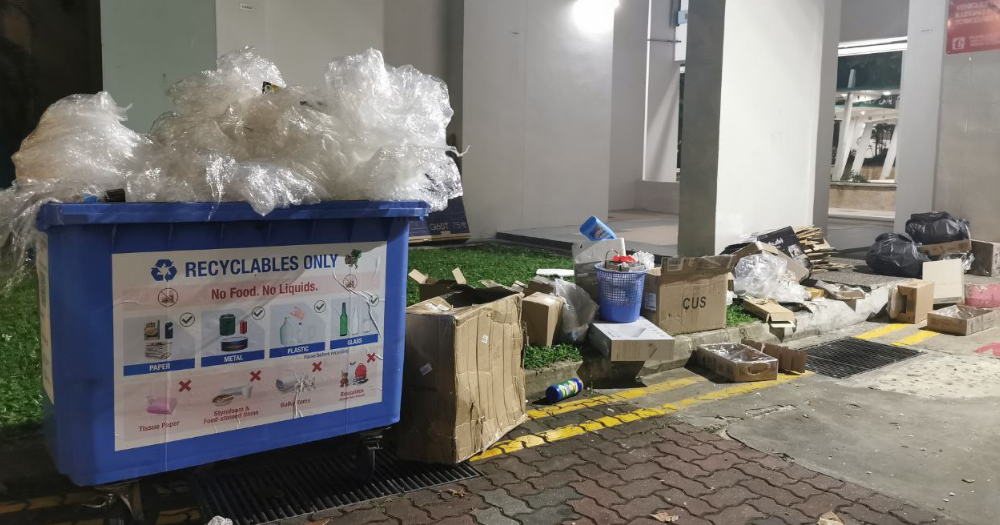Follow us on Telegram for the latest updates: https://t.me/mothershipsg
Overpackaging is a widespread problem faced by consumers, according to a study by the Singapore Environment Council (SEC) released on Aug. 2.
Conducted in collaboration with KPMG, the study looked at consumer attitudes towards packaging to find ways to reduce packaging waste through the 3Rs -- Reduce, Reuse and Recycle -- as well as to transform the waste cycle.
How the survey was conducted
During the study, 1,116 respondents were asked to fill up an online questionnaire consisting of MCQ questions.
Two surveys were done from June to August 2021.
Close to 60 per cent of the survey participants are female while close to 40 per cent are male.
A majority of the participants are aged between 15 and 60.
Poor public awareness on what can be recycled
The study noted a lack of public awareness on which packaging items are recyclable in Singapore.
17 per cent of respondents thought styrofoam containers, which are too expensive to be recycled in Singapore, were recyclable.
At the same time, only 36 per cent of respondents and 45 per cent of respondents indicated correctly that bubble wrap and plastic envelopes are recyclable.
78 per cent of respondents also stated that they are unable to discern the recyclability based on the information found on the packaging.
Uncertainty about which items are recyclable or not was also named the second biggest challenge in recycling (21 per cent), behind the effort required to wash and clean recyclables when recycling (23 per cent).
Notably, the effort to separate recyclables from other waste is a key deterrence as well (19 per cent).
Some not willing to pay more
On a more encouraging note, the study showed that consumers are keen on sustainable packaging.
95 per cent of respondents indicated that they are inclined to purchase a product that has sustainable packaging.
Having said that, about 53 per cent of the respondents said they are only inclined to buy a product that has certified sustainable packaging if it is not more expensive.
When surveyed about other packaging considerations in purchasing a product, 20 per cent said they did not have any other deciding factors other than price.
This is followed by considerations about the environmental footprint of the packaging (18 per cent), whether the packaging can be recycled (18 per cent), and whether the packaging can be reused (17 per cent).
While one could say that this means people in Singapore are not putting their money where their mouth is, it also suggests that manufacturers must be practical in cost to drive a change in consumer behaviour, said Cherine Fok, director of sustainability services at KPMG in Singapore at the media briefing.
"Then perhaps it is up to the manufacturers, and all of us, to think about the upstream of how to develop sustainable packaging that is much more affordable," added Fok.
Too much packaging that should be reduced
A demand for less packaging was also noted among consumers.
A majority of the respondents (84 per cent) found that there is too much packaging material for the products they purchase, and a minority (16 per cent) said the amount of packaging is just right.
70 per cent of respondents felt the amount of packaging should be reduced, while 11 per cent said they should be recycled and 3 per cent said they should be incinerated to produce energy.
Need for clearer eco-labelling
The study also signals the need for greater consumer education on recycling, as over half of respondents said they had insufficient information about sustainable packaging and its benefits.
Additionally, half of all respondents found it difficult to obtain information on product packaging, and 28 per cent said they were not sure what to look out for regarding the packaging's recyclability, reusability or disposal method.
The study suggested that one productive way to better inform consumers when making purchases is to have clear eco-labels on packaging as one-third of the survey participants said they refer to the packaging itself for environmentally-friendly information.
Jen Teo, the executive director of SEC, said the results should encourage businesses to cut down on packaging while exploring more sustainable options at the same time.
She said that doing so would be a "long journey", as businesses would need to undertake an ecosystem-wide shift to make changes to the product design upstream while increasing the proportion of recycled materials in the packaging.
Solid waste increased by seven times in 40 years
Of the 6.94 million tonnes of solid waste generated in Singapore in 2021, over a quarter consisted of domestic waste, which contributed to over 11 million kilograms of carbon dioxide equivalent (KgCO2e) via incineration, SEC revealed.
SEC also highlighted at the media briefing that the amount of solid waste generated has increased by seven-fold over 40 years.
Under the Singapore Green Plan, Singapore aims to reduce the amount of waste sent to Semakau Landfill by 30 per cent while attaining a 70 per cent overall recycling rate by 2030.
Although the recycling rate of the non-domestic sector stood at 70 per cent in 2021, the domestic recycling rate remains low at 13 per cent.
Sustainable packaging in Singapore
Top image by Zheng Zhangxin.
If you like what you read, follow us on Facebook, Instagram, Twitter and Telegram to get the latest updates.

